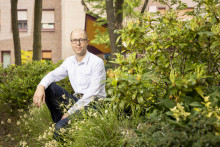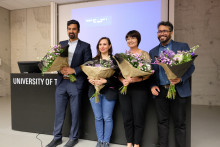This year Nelly Litvak received the Decentralized Education Award. Her heart is clearly with teaching, but her views on teaching have changed through the years and her first steps in this profession were tough. When she started teaching in Russia, more than 20 years ago, the thing she cared about the most, was whether her students liked her or not. That lasted till the first exams, when the results of her students were quite disappointing. Since then she realized it is more important to focus on giving good lectures and knowing everything about the subject, to make students understand the subject, rather than being liked.
Now, many years later, Litvak changed her opinion on teaching again. She now believes that the most important thing is to keep the attention of the students and keep them active. Maybe students will not immediately agree. In fact, they love to be told things, for example in lectures, where they can passively sit back and listen. It is natural: people like to get things with minimal effort. However, that is not the best way to learn. Ideally, teachers should keep students actively involved in class. It is arrogant to think that students will remember everything they hear during a lecture.
It does not mean that Litvak radically abolished her lectures. However, she now focuses on the main topics; connecting the dots, rather than stressing out every detail. Teachers need to show the big lines, the rest can be obtained in a textbook. The students can be involved by asking them questions during the lectures, which they can reply to via their phones or laptops. The best way to teach also depends on the ‘type’ of student. Litvak teaches Statistics to mechanical engineers. With these students it is crucial to give examples that are relevant for their profession. Mechanical engineers are interested in case-studies, so some years ago Litvak asked them to come up with their own examples, which she now uses in her lectures.
Another way to keep students involved, is through a special homework system designed by Eric Mazur from Harvard University. In this method, it is not about the answer, but the way you got to your answer. This takes away the pressure of making mistakes, because making mistakes is useful, she says. Students need to explain how they got to their solution, rather than to be correct. According to a Field Medalist Bill Thurston, ‘mathematics is a science of explanation’. After making their homework, students come together in groups, where they can discuss and correct their solutions. They are graded by the completeness of their homework and the final result they got with their group. In the end it is all about explaining your thought process clearly, about trying and not giving up.
The importance of teaching Mathematics is clear to Litvak. Not only for students, but also for a broader audience. She recently wrote a book, ‘Who needs mathematics?’, about the applications of mathematics in digital technologies. The book was nominated for Russia’s highly prestigious ‘Enlightener’ award for popular scientific writing. Mathematics is often taught with the wrong attitude in school, she states. People forget the things they learned in school, which is an indication of the wrongness of the method. It is all about thinking fast and having a good memory, repeating standard tricks, while math is really about creativity and understanding. Mathematicians should reach out to the world and explain why mathematics is important. It deals with real world problems.







